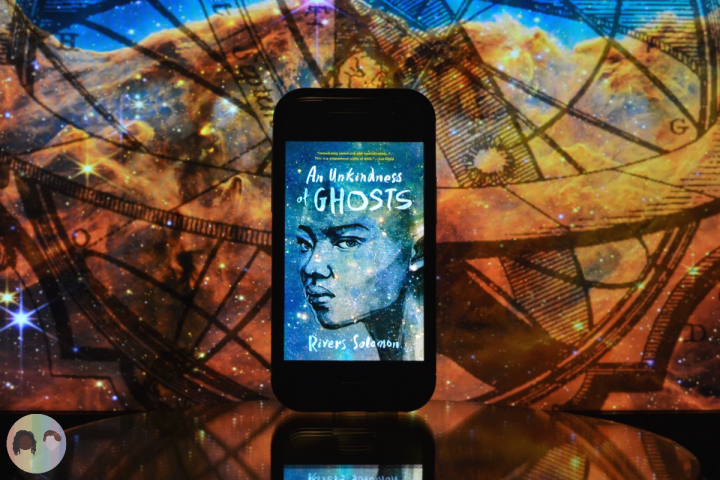
“History wanted to be remembered. Evidence hated having to live in dark, hidden places and devoted itself to resurfacing. Truth was messy. The natural order of an entropic universe was to tend to it.”
Last issue, I reviewed a novella written by Rivers Solomon (they/them) in collaboration with LA experimental hip-hop group clipping. As I hope that review adequately expressed, I find Solomon to be a fascinating writer who masterfully spins haunting stories that are undoubtedly fictional (considering the beautiful science-fantasy worlds they build) but are infused with commentary on systemic atrocities that feel all-too-familiar. An Unkindness of Ghosts is no different. Haunting and unnerving, this novel explores class divides and racial segregation in a chilling mystery onboard a massive spaceship that serves as a space-bound colony that has existed for generations. Our protagonist lives in the lowest deck, described as the “slums” of the HSS Matilda, transporting the survivors of humankind towards their ultimate destination of the supposed last hope for humanity, referred to as the “Promised Land.” Dark-skinned passengers like Aster are dealt the short end of the stick, but this queer, neurodivergent protagonist is used to life’s cruelties and only really seeks the truth. What truth, you ask? I fear saying so verges too far into spoiler territory.
Much like The Deep, An Unkindness of Ghosts is a brilliant piece of speculative fiction that leads the reader through a windy, slowly unravelling story until you reach the end, release a pent-up sigh of “Oh,” and go on to think about it for weeks on end. Solomon is a master at worldbuilding without letting on too much of anything, forcing you as the reader to put the pieces of the story, its characters, and the world itself together while experiencing the characters’ realities with barely a speck of exposition. This type of storytelling can be infuriating (as it was for me at times), but Solomon’s approach makes for an intriguing, yet unnerving journey where you aren’t quite sure what’s happening until you do, and then oh…
As is characteristic of Solomon’s work, An Unkindness of Ghosts is a work best described as extraordinarily gender non-conforming, neurodivergent, anti-authoritarian poetry meant to hit you right in the feelings if you give it the chance to. Also like The Deep, this novel is about the phenomena that is collective trauma and survival. The book tackles issues like racism and colourism, heteronormativity and gender norms, and class-based segregation and discrimination along intersectional axes in a structure that provides an uncanny mirror to the real world despite its science fictional setting. It is especially easy to see the parallels between what Solomon paints in this novel and slavery, and it’s both so subtle and yet starkly vivid that it makes for a sickening study of human nature. Between discussions of individual and collective trauma, parts of the book can be borderline unbearable, depending on what your triggers are. It is interesting, reflective, inspiring, validating, and devastating all at once.
“I am a boy and a girl and a witch all wrapped into one very strange, flimsy, indecisive body. Do you think my body couldn’t decide what it wanted to be?”
“I think it doesn’t matter because we get to decide what our bodies are or are not.”
As I said early on in this review, this book is really not an easy read, and the way in which Solomon masterfully sucks the reader into the story makes it even more difficult to parse through some really difficult themes. The characters are incredibly dynamic and endlessly fascinating, making the story compelling even when you don’t quite know what the story is yet. Aster is a black, queer, neurodivergent whirlwind of a character with a brilliant head on her shoulders, even if her sense of self-preservation is (unintentionally) lacking. It is easy to feel unbalanced by the plot, which really is all over the place, and yet grounded by the characters in their convictions. And honestly, the ending is not satisfying in the least, but that is par for the course in Solomon’s work.
Nevertheless, if the book seems of interest to you, I would definitely recommend it. I should probably say what I have said to everyone else to whom I’ve recommended this author to: Rivers Solomon’s work is not for everyone, and that’s perfectly okay. Their writing is literary and prose-like. It’s not an easy read, both for the writing style and for the subject matter. It’s probably not something you’ll want to read at least until the term is over.
Even with the difficult parts, the unevenness of the story (the book is more character-driven as opposed to plot-driven), Solomon’s commitment to the themes, and the honesty of the characters make it easy to fall in love with the novel as a whole. But honestly, I can’t say that other readers would necessarily agree with me. In fact, I’ve seen many reviews say some version of “it’s good, but I didn’t like it,” but to me, that still doesn’t detract from the beauty of this book and its characters, if you have the space to appreciate it (and if you don’t, that’s more than okay!) If you do plan to pick this book up (ideally, after the term’s end), buckle up and prepare to be hit in the face with real-world trauma brilliantly disguised as fiction. It’s a bumpy ride, but one that I thoroughly enjoyed.
Content warnings (mind the spoilers!): racism; slavery; violence; death; mention of sexual abuse; attempted rape; race/class oppression; suicidality; attempted suicide; multiple mentions of past suicide; abortion; amputation; arson; misgendering; homophobia; murder of a child; loss of a parent; domestic violence; self-mutilation; torture; public execution.
